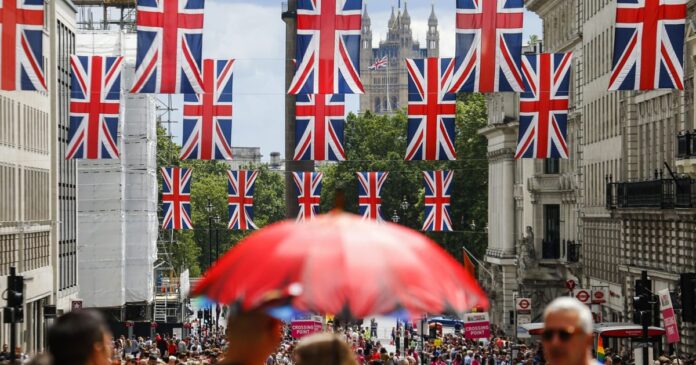Inflation in the U.K. fell broadly in line with market expectations in July despite some underlying signs of stagnation, while a drop-off in energy and food prices contributed to a surprise fall in household bills.
The data offers relief for consumers but mixed messages for the Bank of England (BoE), whose aggressive hiking cycle is finally starting to show signs of bringing Britain’s sky-high inflation down ― but it still faces considerable headwinds from wages and costly services.
The Consumer Price Index (CPI), a key measure of inflation, rose by 6.8 percent in July from the year before, down from 7.9 in June, in line with market expectations, according to data released Wednesday by the Office of National Statistics.
That headline figure will be welcome news for U.K. Prime Minister Rishi Sunak and his government, which pledged in January to halve inflation by the end of 2023, though that target still remains far off.
Chancellor Jeremy Hunt was quick to claim credit for the turn in the trend.
“The decisive action we’ve taken to tackle inflation is working, and the rate now stands at its lowest level since February last year,” he posted on X, formerly the social media platform Twitter. “While price rises are slowing, we’re not at the finish line. We must stick to our plan to halve inflation this year and get it back to 2 percent.”
British voters will be especially pleased that core RPI, a measure of the Retail Price Index excluding mortgage repayments, fell to 7.9 from 9.6 percent from the previous year, 0.4 percent lower than expected. Also welcome will be news that inflation including housing costs is at its lowest since March 2022 at the onset of the war in Ukraine.
Stubbornly flat
Despite the good news, and in a headache for policymakers, core inflation, which excludes volatile food and energy, remained stagnant in July at 6.9 percent on an annualized basis and 0.1 percent higher than forecast, largely due to higher hotel and air travel prices caused by the boom in tourism over the summer.
The fall in consumer prices, meanwhile, was largely driven by a drop-off in gas and electricity costs in July, while food prices, notably milk, cheese and eggs, also dropped at a slightly slower rate, according to the ONS.
“It’s positive that headline inflation is coming down in line with market expectations but it’s almost entirely driven by energy,” said Raoul Ruparel, Director at Boston Consulting Group’s Centre for Growth.
Some now fear that if energy prices continue their ascent in August that could feed into a growing risk of stagflation ― where inflation is high and growth slows.
“That’s something out of [central] banks’ control, it’s more exogenous, and once you set that aside core is where it’s at, ” said Ruparel. Services have gone up, and we’re not seeing impacts we were hoping for in terms of rising interest rates translating to the rest of the economy. The sign is inflation is becoming a bit embedded.”
Exuberant spending over the summer on vacations and leisure is also having an impact on service costs, with workers continuing to claim higher wages and earnings rising by a record amount in July.
A rise in services costs to 7.4 from 7.2 percent is especially concerning for the Bank of England, largely driven by the highest rise in rents since 2005.
The services uptick came as firms seeking to defend thin profit margins declined to pass on the benefits of cheaper energy prices to consumers, most notably in the hospitality sector, Jamie Dutta, market analyst at broker Vantage told POLITICO. Though energy prices are now edging up again, he added, they still remain low compared with last year, which may provide an impetus to cut prices in the near future.
Eager to bring an end to one of the worst inflationary episodes in Europe, the BoE has raised interest rates 14 times since December 2021, threatening a recession while putting hundreds of thousands of British homeowners at risk.
The bank has repeatedly come under fire for its failure to act quickly at the outset — and then acting too aggressively as other inflation-hit countries hit the brakes — leading to the worst bout of inflation among the world’s seven richest countries.
Markets still anticipate that the BoE still has some way to go before inflation is properly kept in check and are pricing in another 0.75 percentage points worth of rate hikes — 0.5 percentage points at September’s meeting — taking the peak rate to 6 percent.
“Unless we start to see real feed-through of interest-rate impact across the rest of the economy it’s not guaranteed inflation will come down,” said Ruparel. “I’d lean towards them taking action in the next few months.” The U.K. will likely remain an “outlier,” he added, due to its uniquely tight labor market, caused in part by Brexit and the pandemic.
There are nevertheless hopes that the Bank of England’s hiking cycle will soon draw to a close. The bank’s Monetary Policy Committee recently softened its stance, noting in early August that its aim was to keep rates “restrictive” while minimizing harm to the economy. But it also reiterated that rates would remain high to “ensure that bank rate was sufficiently restrictive for sufficiently long.”


